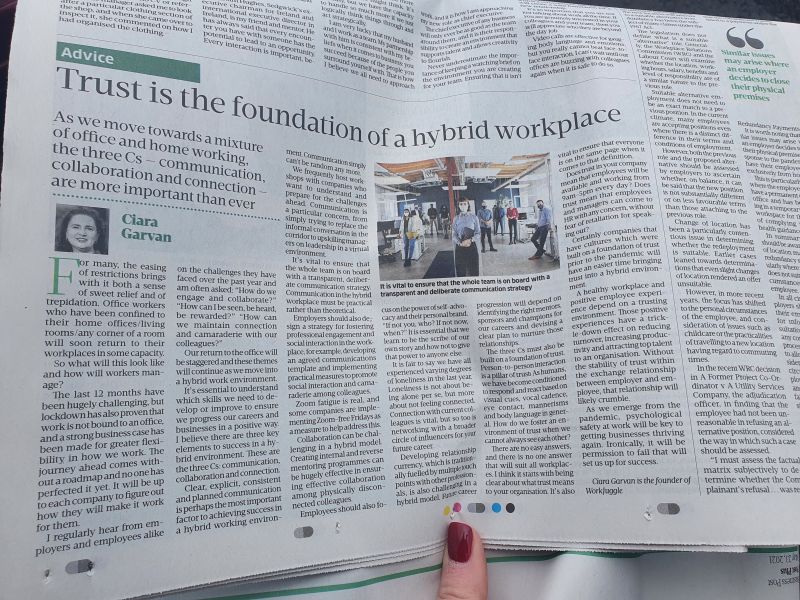In the article Ciara talks about the importance of the 3 C’s. Communication, Collaboration & Connection.
“For many the easing of restrictions brings with it both a sense of sweet relief and trepidation. So called ‘office’ workers who’ve been confined to their home offices/ living rooms/ any corner of a room, will soon return to their workplace in some capacity. What will this look like and how will workers manage?
It is true the last 12 months have been hugely challenging, but lockdown has also proven work is not bound to an office and a strong business case has been made for greater flexibility in how we work. The journey ahead certainly comes without a roadmap and no one has perfected it yet. It will be up to each company to figure out how they will make it work for them.
I regularly hear from employers and employees alike on the challenges they’ve faced over the past year and am often asked “How do we engage and collaborate”, “How can I be seen, be heard, be rewarded?” “How can we maintain connection and camaraderie with our colleagues?” As our return to the office will be staggered, these themes will continue as we now move into a hybrid work environment.
As we adjust to this new style of working it’s essential to understand which skills we need to develop, or improve, to ensure we progress our careers and businesses in a positive way. I believe there are three key elements to success in a hybrid environment. These are the three C’s – Communication, Collaboration and Connection.
Clear, explicit, consistent and planned communications is perhaps the most important factor to achieving success in a hybrid working environment. Communication simply can’t be random anymore. At WorkJuggle, we frequently host workshops with companies who want to understand and prepare for the challenges in the unchartered times ahead. Communication is a particular concern, from simply trying to replace the informal ‘conversation in the corridor’ to up-skilling managers on leadership in a virtual environment.
It’s vital to ensure the whole team is on board with a transparent, deliberate communication strategy. Communication in the hybrid workplace must be practical rather than theoretical.
Employers should also design a strategy for fostering professional engagement and social interaction in the workplace, for example, developing an agreed communications template and implementing practical measures to promote social interaction and camaraderie amongst colleagues. Zoom fatigue is real, very real and some companies are implementing Zoom-free Fridays as a measure to help address this.
Collaboration can be challenging in a hybrid model. Creating internal and reverse mentoring programmes can be hugely effective in ensuring effective collaboration amongst physically disconnected colleagues. Employees should also focus on the power of self-advocacy and their personal brand. “If not you, who? If not now, when?” It is essential that we learn to be the scribe of our own story and how not to give that power to anyone else.
It is fair to say we have all experienced varying degrees of loneliness in the last year. Loneliness is not about being alone per say but more about not feeling connected. Connection with current colleagues is vital but so too is networking with a broader circle of influencers for your future career.
Developing relationship currency, which is traditionally fuelled by multiple ‘touch-points’ with other professionals, is also challenging in a hybrid model. Future career progression will depend on identifying the right mentors, sponsors and champions for our careers and devising a clear plan to nurture those relationships.
The three C’s – communication, collaboration and connection must also be built on a foundation of trust. Person to person interaction is a pillar of trust. As humans, we have become conditioned to respond and react based on visual cues, vocal cadence, eye contact, mannerisms, and body language in general. How do we foster an environment of trust when we cannot always see each other?
There are no easy answers, and there is no one answer that will suit all workplaces. I think it starts with being clear about what trust means to your organisation. It’s also vital to ensure that everyone is on the same page when it comes to that definition. Does trust in your company mean that employees will be available and working from 9am-5pm every day? Does trust mean that employees and managers can come to HR with any concern, without fear of retaliation for speaking out?
Certainly companies that have cultures built on a foundation of trust prior to the pandemic will have an easier time bringing trust into a hybrid environment.
A healthy workplace and a positive employee experience depend on a trusting environment. Those positive experiences have a trickle-down effect on reducing turnover, increasing productivity, and attracting top talent to an organization. Without the stability of trust within the exchange relationship between employer and employee, that relationship will likely crumble.
As we all now hopefully emerge from a global pandemic, psychological safety at work will be key to getting businesses thriving again. Ironically, it will be permission to fail that will set us up for success. “
We delve into all of this and more in WorkJuggle’s half day workshop on “Upskilling for Virtual Impact”. This is currently running with great feedback to date. If you think you might be interested in learning more please do email Aoife@workjuggle.com

